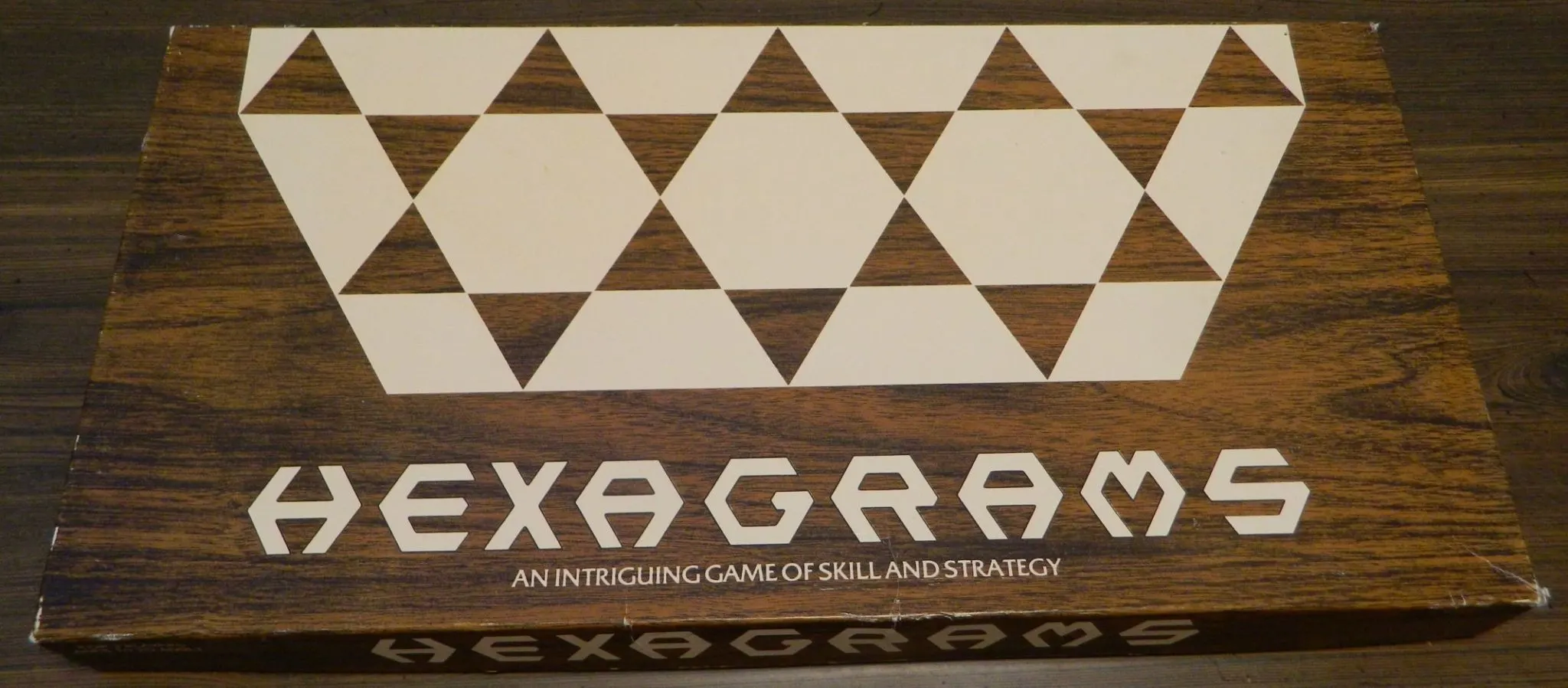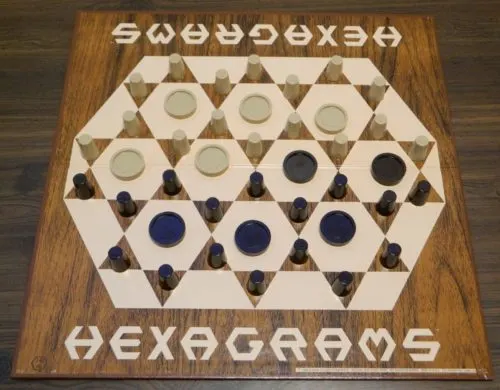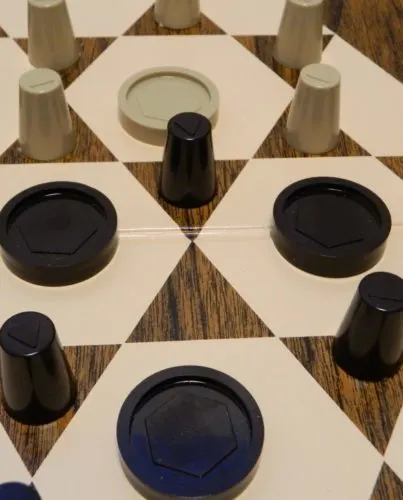The game of Checkers is one of the oldest board games that is still widely played today. With how old and popular the game is it has lead to a lot of spinoff games throughout the years. All of these spinoff games try to take the original Checkers gameplay and tweak it some to try and improve upon the original game. While I don’t mind Checkers I have been looking for a game that improves upon it for quite a while. I have tried out quite a few of these Checkers spinoff games and I have yet to find one that really distinguishes itself or improves upon the original game. Today I am looking at another of these games Hexagrams which was a locally published game made in Wisconsin in 1988. While Hexagrams mostly looked like your basic Checkers game I was intrigued by the idea that the game featured two different types of pieces. Hexagrams has some interesting ideas that unfortunately don’t really work leading to another pretty bland and boring Checkers spinoff.
How to Play Hexagrams
Setup
- Setup the gameboard as shown below. Turn the gameboard so the Hexagrams logo is in front of both players.
- The players choose who will start the game with whatever method they prefer.
Playing the Game
In Hexagrams there are two types of playing pieces.
Triads are the taller pieces that are placed on the triangle spaces. Triads may only be moved in a forward direction (towards the other side of the board) one space to one of the adjacent triangles. Triads may only capture Triads.
Hexads are the larger flatter pieces. They can moved one space in any direction from one hexagon to another. The catch is that they can’t be moved in a direction if there are any Triads (of either player) in the way. Hexads may only capture Hexads.
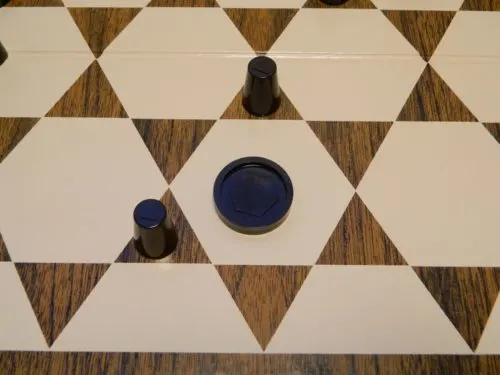
This Hexad piece cannot move to the space to the left, up and left, or up and right because there are Triads blocking the path. The Hexad may move to the space on the right as there are no Triads blocking the path.
On a player’s turn they will get to move one of their pieces. There are a couple rules that dictate what move a player can make.
- A player can capture an opponent’s Triad if they have a Triad on an adjacent triangle. To capture a Triad you will move your piece to the other piece’s space and remove the other piece from the board. When a player can capture a Triad they must do so. If there are multiple capture opportunities the player can choose which capture they would like to make. Due to how the board is setup the first couple of turns will be players capturing each other’s Triads.
- The only exception to this rule (being forced to capture Triads) is if a player can capture a Hexad. They can choose to capture the Hexad instead of a Triad. A player can capture a Hexad if it sits on a space next to an opponent’s Hexad and there are no Triads in the way blocking you from moving in that direction. Unlike Triads a player can choose not to capture a Hexad.
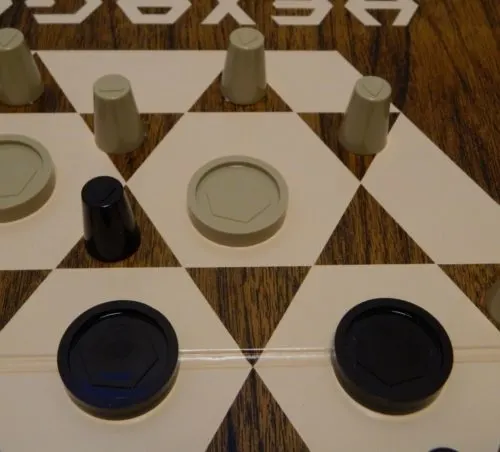
In this situation there is both an opportunity to capture a Triad or a Hexad. There are no Triads between the two Hexads on the right side of the picture so the next player can choose to capture the other player’s Hexad. If they choose not to capture the Hexad they must capture the Triad to the left.
- If there are no Triad capture opportunities a player may move any piece one space following the movement rules.
- If a Triad reaches the end of the board a player can use their turn to move it one more space which will move it off the board. The piece will then be removed from the board.
End of Game
The game can end in one of two ways.
If one player captures all of the player’s Hexads they will win the game.
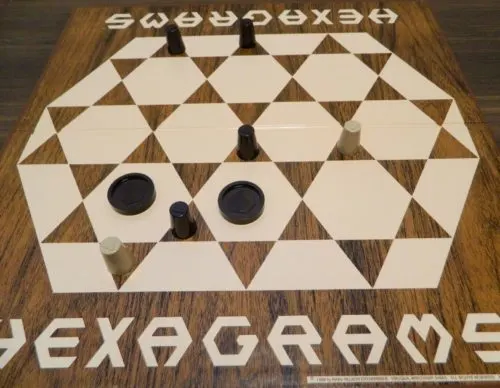
The player using the black pieces has captured all of the other player’s pieces. The black player has won the game.
A player can also win the game if they place their Triads in a way where the other player can’t move any of their Hexads and has no Triads that they can move.
Situations
While playing the game there are a number of situations that can develop which will lead to a deadlock. These situations are as follows (these were not particularly clear in the original instructions so I apologize if they are hard to follow):
The players will reach an impasse if players are just moving their Hexads away from one another. In this situation one of the players can declare that they are breaking the deadlock. On their turn they will move one of their Triads. In this situation the other player must also move one of their Triads. The only exception is if the first player’s move opened up an opportunity for the other player to capture one of their Hexads. This may be used several times in order to break the deadlock.
When both players have the same number of Hexads, which can’t be captured or trapped, and one of the players have no remaining Triads; the player with Triads remaining will win the game.
If both players have the same number of Hexads that aren’t trapped and neither player can capture or trap the other player’s Hexads due to the placement of the Triads, the game will end in a draw.
If both players have a different number of Hexads the player with more Hexads will decide which player will make the first move to break the deadlock by moving a Triad. If there is no way to break the deadlock the player with the most Hexads that aren’t trapped will win the game.
In the unlikely situation that both players have the same number of Hexads and both have only one Triad left which is at the end of the board, the game allows players to use Hexads to capture Triads. The first player to capture the other player’s Triad will win the game.
If none of these situations resolve the deadlock the game will end in a draw.
My Thoughts on Hexagrams
At its core Hexagrams feels like it shares a lot in common with Checkers. While you might not be jumping over pieces the movement in the game is pretty similar to Checkers. The objective of the game is to try and capture all of the other player’s pieces. This involves moving to an adjacent space to capture an opponent’s piece. Basically players take turns capturing pieces and moving their pieces into advantageous positions.
The main area where the Hexagrams differs from Checkers is that there are two different types of playing pieces. Each type of piece moves on different spaces and has its own purpose. The Hexads are the key pieces in the game. In order to win the game you must capture or trap all of the other player’s Hexads. Standing in the way of players capturing each other’s Hexads right away are the Triads. The Triads are used more as defensive pieces and are basically the foot soldiers in the game. Most of your turns in the game will involve moving a Triad. The Triads are important as they can impact the directions that the Hexads can move. You can use the Triads to build a wall around your Hexads so the other player can’t capture them.
The ultimate goal of Hexagrams is to capture the other player’s Hexads, but most of your turns will involve you capturing the other player’s Triads. Every single game begins with one player capturing one of the other player’s Triads. The other player is then forced to return the favor by capturing one of the other player’s Triads. This continues for at least a couple turns where players take turns capturing one of the other player’s pieces. Eventually the logjam in the middle of the board will clear out, and then you can start to make some choices of your own instead of being forced to capture one of the other player’s Triads.
This is the point where the game really begins. These first decisions you make when you truly have a choice will likely determine how you will do in the rest of the game. Basically the strategy in Hexagrams comes down to forcing the other player into making captures that benefit you. Like Checkers the game forces players to make captures whenever they can. You might think that it is not a good thing to have your pieces captured, but I think the best strategy in Hexagrams involves you forcing players to make captures that they don’t want to make. The best moves in the game usually involve a player forcing another player to capture one of their Triads. This can be used against another player because you can use it to force the player to move the Triad that is keeping one of their Hexads safe. By making them capture one of your Triads you can move the Triad out of the way so you can use your Hexad to capture their Hexad. This is one element that Hexagrams shares with Checkers as the best strategies in Checkers involve forcing players to make disadvantageous jumps.
As Hexagrams is an abstract strategy game it is not surprising that the game relies mostly on strategy. Like Chess and Checkers both players are always given perfect information. The gameplay revolves around outsmarting your opponent by coming up with a strategy where they are forced to make captures that will benefit you. Outside of being able to predict what the other player will do and being able to trick the other player into making the wrong move, there really isn’t any luck in the game. The player with the best strategy will very likely win the game. One wrong move can also pretty much ruin your chances of winning the game.
For a game that relies almost entirely on strategy I will admit that the game is simpler than I expected it to be. The game is more difficult than a game like Checkers due to having two different types of pieces with different abilities. The game is still quite straightforward though. The game’s official rules are written in a way which makes them harder to understand than they should be. The actual game is quite easy though. The game has a recommended age of 10+ which seems appropriate even though I think children even a little younger could probably play it.
I give Hexagrams credit for creating an abstract game with some interesting ideas. The game has some interesting twists on abstract games like Checkers. For this reason I think people who are big fans of abstract games could have quite a bit of fun with Hexagrams. The problem is that I wouldn’t consider abstract strategy games to be one of my favorite genres of board games. The problem I have with a lot of these Checkers spin-off games is the fact that I find them to be a little dull. Unfortunately this is true for Hexagrams as well. Fans of these type of games will probably find it to be quite engaging as it looks like it has a lot of potential strategy. The problem is that I didn’t find the game to be all that interesting where I wanted to play it enough to find out. I think I found the game to be boring for a couple reasons.
First Hexagrams is one of those games that you have to play quite a few times before you really get the game’s strategy. You can just play the game for fun, but the player that is more experienced with the game will likely do better. This is especially true due to the fact that one bad move can ruin your chances of winning the game. At the beginning of the game the first couple of captures may seem like they don’t really matter. In actuality they can play a big role in the game. This is because the first couple of turns will likely set off a chain reaction. One bad move in the early game can lead to your opponent getting good positioning. They can then force you to capture a Triad opening them up to capturing one of your Hexad. The other player can then keep repeating this process to get a big lead over you. If you are experienced with the game you can avoid these missteps. Many less experienced players are likely to walk into the trap and be demolished by the other player.
Another problem that leads to the game being kind of boring is the fact that most of your turns will be predetermined or you will have few options. On every turn when you are able to capture a Triad you have to make the move unless you can capture another piece. This leads to a lot of turns where you don’t even get to make a decision. After a while it starts to feel like the game plays itself. When you do have an opportunity to make a move your options are usually limited. This is mostly because the board is on the smaller side where there aren’t a lot of places that you can move pieces. When there are options they usually don’t have much of an impact on the game. This probably gets better the more you play the game, but too often it feels like you don’t get to make meaningful decisions.
The final problem with the game is the fact that I am curious how much the game was playtested. I didn’t really encounter any times where a rule felt broken. This mostly comes from the fact that the game has a bunch of scenarios where the players can become deadlocked. Instead of tweaking the rules so deadlocks didn’t happen so often the instructions just list a bunch of different rules that feel kind of random. I tried to explain these rules in the how to play section but I found them to be poorly written and confusing. Having to include a bunch of random rules for very specific situations is never a great idea. Instead a game should be designed where it doesn’t have to rely on so many rules for specific situations.
For a game that was self published I have to say that the components are about what you would expect. The gameboard quality is pretty basic. The board layout is a twist on your typical checkerboard. The playing pieces are nothing special. They are made of thicker plastic which is nice, but they are pretty bland overall. This would normally be a turnoff for the game except that abstract strategy games are not really known for their component quality. The components basically do their job and not much more which is what you would expect out of most abstract strategy games.
Should You Buy Hexagrams?
At the end of the day I am not particularly surprised that Hexagrams never became a big hit. On the surface it feels like another Checkers variant as it does share some very similar mechanics. Where the game differentiates itself is the fact that the game utilizes two types of pieces. One of the types of pieces are the main pieces that you must capture to win the game. The other pieces are used more defensively to protect and trap the main pieces. Most of the gameplay revolves around moving the Triads to capture the other player’s Triads. The key strategy seems to come from forcing the other player into making captures that leaves their Hexads vulnerable. As an abstract strategy game Hexagrams relies on quite a bit of strategy, and yet it still is pretty easy to play. Hexagrams has a lot to offer to people who like abstract strategy games. Unfortunately I found the game to be kind of boring. One bad move in the game could set off a chain reaction where you get destroyed by the other player. There are also too many turns where it doesn’t feel like you are making any meaningful decisions.
If you aren’t a big fan of Checkers or abstract strategy games in general I don’t see you enjoying Hexagrams as you will likely find it to be pretty boring. People who really like abstract strategy games with a Checkers-like feel to them will probably really like Hexagrams though. If that describes you I would look into picking up Hexagrams.

